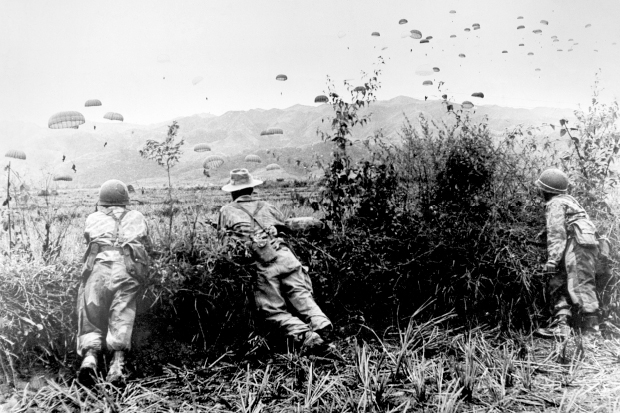Sir Alistair Horne, like that other great knight of military history, Sir Michael Howard, served in the Coldstream Guards during the second world war. According to Clausewitz (in Vom Kriege), his judgment will therefore be invested with insight denied to those who have never been shot over:
As long as we have no personal knowledge of war, we cannot conceive where those difficulties lie of which so much is said, and what that genius and those extraordinary mental powers required in a general have really to do. . . But if we have seen war, all becomes intelligible.
So it is disappointing to read the late Sir Martin Gilbert, quoted with apparent approval in the preliminaries: ‘I’m not a theoretical historian, seeking to guide the reader to a general conclusion. I’m quite content to be a narrative chronicler, a slave of the facts.’
Except, fortunately, Horne then ignores Gilbert’s prim admonition, to give us instead a nought-for-your-comfort reflection on war in the bloodiest century ever. Indeed the book, echoing Clausewitz, might simply have been called On Twentieth-Century War, but perhaps modern publishing demands a catchier title, and thus Hubris.
And hubris is indeed the consistent theme of an otherwise eclectic choice of wars, campaigns and battles, many of them relatively obscure, though they share the characteristic that the strategic impact of defeat is far greater than the immediate and tactical. Thus, for example, the battle of Nomonhan, at which an over-confident Japanese army was worsted by the Russians in Manchuria in 1939, meant that two years later Stalin could afford to withdraw troops from the Far East to defend Moscow, without which, Horne suggests, the city would probably have fallen to the Germans, which would have been the end of Stalin. Yet the origin of Nomonhan was Tsushima in the Russo-Japanese War of 1905, another of Horne’s chapters: ‘Such is the knock-on effect of history.’
The joy of this book (if joy is appropriate when reading about war) is being taken out of the usual realm of military history into less familiar theatres. The choice of Moscow rather than Leningrad or Stalingrad is instructive, and Horne pays ample tribute to the pen of a former British ambassador to Russia, Rodric Braithwaite, and his Moscow 1941: A City and its People at War (2006). A few pages of this astonishing saga are enough to explain why Putin evidently isn’t inclined to lie awake at night worrying about the West.
All Horne’s chapters are cautionary tales, but those that stand out as having the greatest relevance are on Korea (and ‘knock-on’ Dien Bien Phu in French Indo-China). If hubris is the arrogant belief that man can act like a god — indeed challenge the gods with impunity — then General of the US Army Douglas MacArthur is the 20th century’s Icarus. In 1945, after the war in the Pacific, he ranked with some of the greatest generals of all time. His recovery of the situation in 1950, by the masterly amphibious counter-stroke at Inchon after the North Koreans had overrun virtually the entire south of the peninsula, is an unsurpassed lesson in boldness and surprise. But then, apparently believing that success was his permanent habit, he decided to take on China — and thereby his own president, the failed Missouri haberdasher Harry S. Truman. The 50-odd pages alone on MacArthur and his legacy should be studied at every war college.
There is a problem with cautionary tales about hubris, however. William Manchester called his biography of MacArthur American Caesar. But Caesar knew well enough what he was doing when he crossed the Rubicon; the Roman statutes were clear enough. Likewise, Icarus knew that flying was reserved for the gods. And how dumb was Arachne to boast that she could weave better than Athena? MacArthur knew perfectly well that not only was Truman head of state, he was commander-in-chief. Spectacular success, and distance from Washington, as well as professional contempt for a man who had been a mere battery commander in the Missouri National Guard, played their parts. MacArthur needed the crouching slave in the triumphant processional chariot: ‘Remember thou art but a man…’
But what are the other gods that a military commander must not offend? For example, is the motto ‘Who Dares Wins’ chancing it? Undoubtedly. And success does breed success: an enemy worsted often or heavily enough can come to believe an opponent is unbeatable. As a technical manual on
caution, this book might simply be called Overreach, which would then invite criteria for measuring ‘reach’ proportionate to ends, ways and means, though even this would end up needing the exercise of judgment.
So despite all the lessons of history, hubris looks set to remain a feature of war, not only through honest miscalculation but because it is in the nature of things. Indeed, the author ends with a chilling organic analogy, to that of plague: we open Pandora’s box at our peril, from out of which may come ‘the dormant bacillus of hubris’.






Comments